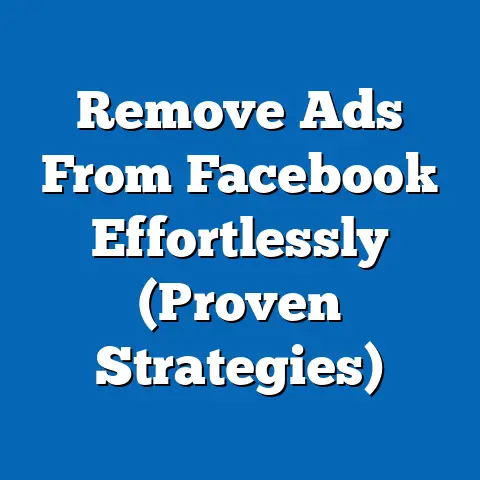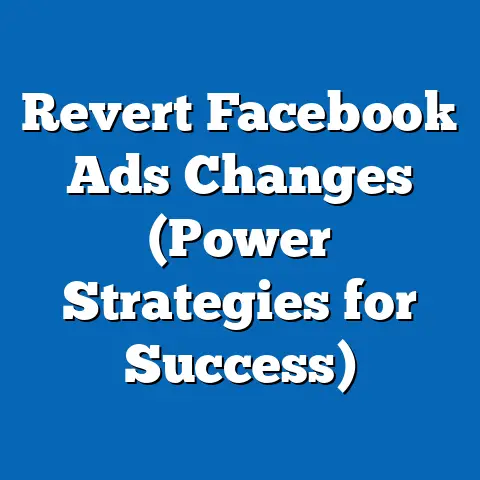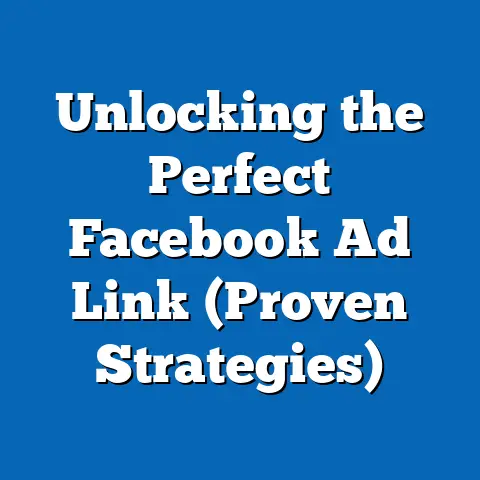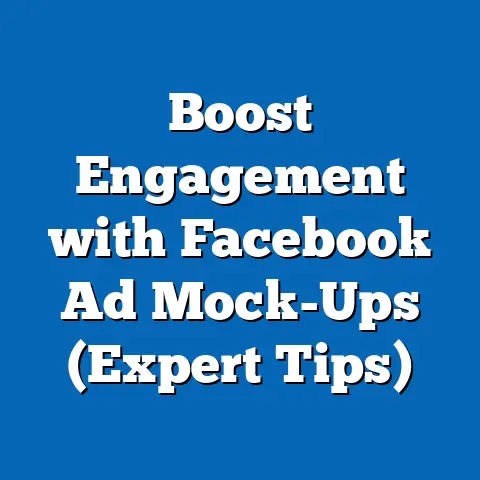Recover Facebook Ads After Account Issues (Key Strategies)
In today’s digital world, social media advertising is essential for businesses, especially those in the pet industry.
Think about it: Where do pet owners go to share adorable photos of their furry friends, look for advice on pet care, and discover new products?
Facebook!
Facebook ads offer a powerful way for pet-related businesses like pet grooming services, pet food delivery, and pet supply stores to connect with their ideal customers.
However, this digital lifeline can be severed by a common problem: account suspensions or bans.
I’ve seen firsthand how disruptive these issues can be, leaving businesses scrambling to salvage their advertising efforts and, ultimately, their revenue.
But don’t despair!
This article will provide you with actionable strategies to recover your Facebook ads account after encountering such issues.
I’ll walk you through the steps to understand Facebook’s policies, craft a compelling appeal, implement preventative measures, and even explore alternative advertising options.
With the right approach, you can get back on track and continue to thrive in the online marketplace.
Understanding Facebook Ads Policies
Facebook’s advertising policies and community standards are the foundation of their platform, designed to create a safe and positive experience for users.
But sometimes, navigating these policies can feel like walking through a minefield, especially for businesses in specific niches like the pet industry.
It’s crucial to understand these guidelines to avoid unintentional violations that could lead to account suspension or bans.
Common Reasons for Account Suspension
There are several reasons why Facebook might suspend or ban an account.
These often include:
- Misleading Content: Facebook strictly prohibits ads that contain false or deceptive claims.
In the pet niche, this could include exaggerated promises about pet health products or services.
For example, an ad claiming a particular dog food will “cure all allergies” is a definite no-no. - Inappropriate Targeting: Facebook has rules about targeting certain demographics with specific types of ads.
Targeting vulnerable groups with ads that exploit their fears or insecurities is a major violation. - Negative User Feedback: If your ads consistently receive negative feedback from users, such as complaints about misleading information or poor quality products, Facebook may take action against your account.
- Violating Community Standards: Promoting products or services that violate Facebook’s community standards, such as those involving animal cruelty or illegal activities, will result in immediate suspension.
Examples of Policy Violations in the Pet Niche
To illustrate, let’s look at some concrete examples of what constitutes a violation in the pet niche:
- Health Claims Without Substantiation: Promoting a pet supplement with unsubstantiated claims about its health benefits, like “eliminates arthritis pain in just one week!”
- Exploiting Pet Owner Emotions: Targeting pet owners with ads that prey on their anxieties about their pet’s health or safety, such as “Don’t let your dog suffer!
Buy our expensive anti-flea treatment now!” - Misrepresenting Products or Services: Using misleading images or descriptions to exaggerate the quality or effectiveness of a pet product or service.
- Promoting Unethical Practices: Advertising products or services that promote unethical or harmful practices, such as puppy mills or exotic animal trade.
Why Understanding Policies is Crucial
Understanding Facebook’s advertising policies isn’t just about avoiding penalties; it’s about building trust with your audience.
By adhering to these guidelines, you demonstrate that you’re a responsible and ethical business that cares about the well-being of pets and their owners.
Takeaway: Familiarize yourself with Facebook’s advertising policies and community standards.
Regularly review your ads to ensure they comply with these guidelines.
This proactive approach can save you from potential headaches and keep your account in good standing.
Immediate Steps to Take After an Account Issue
Discovering that your Facebook ads account has been suspended or banned can be a truly stressful experience.
It can feel like your digital storefront has suddenly been shut down, leaving you unsure of what to do next.
I remember one client who panicked and started sending angry emails to Facebook support, which only made the situation worse.
The key is to remain calm and take a methodical approach.
Review the Notification
The first and most crucial step is to carefully review the notification you received from Facebook.
This notification should provide a reason for the suspension or ban.
Pay close attention to the specific policy or guideline that Facebook believes you violated.
Understanding the “why” behind the issue is essential for formulating an effective response.
Collect Relevant Data and Documentation
Next, gather any data and documentation that support the legitimacy of your ad campaigns.
This might include:
- Ad Performance Data: Screenshots or reports showing the positive engagement and results of your ads.
- Customer Testimonials: Positive reviews and testimonials from satisfied customers.
- Compliance Documents: Any certifications, licenses, or documentation that demonstrate your compliance with industry standards and regulations.
- Product Information: Detailed descriptions and specifications of your products or services, ensuring they align with Facebook’s policies.
Check for Recent Changes
Take a moment to reflect on any recent changes you made to your ad content or targeting.
Did you update your ad copy, imagery, or audience settings?
Sometimes, even seemingly minor changes can inadvertently trigger a policy violation.
Identifying these changes can help you pinpoint the issue and address it in your appeal.
Staying Calm and Avoiding Impulsive Actions
It’s natural to feel frustrated or even angry when your account is suspended.
However, it’s crucial to stay calm and avoid impulsive actions that could worsen the situation.
Resist the urge to send accusatory or demanding messages to Facebook support.
Instead, focus on gathering information, crafting a clear and professional appeal, and demonstrating your willingness to cooperate.
Reaching Out to Facebook Support
Once you’ve gathered your information and reviewed the situation, consider reaching out to Facebook support for clarification and assistance.
Approach this communication with a polite and professional tone, clearly stating your issue and requesting guidance on how to resolve it.
Remember, the goal is to establish a constructive dialogue and demonstrate your commitment to complying with Facebook’s policies.
Takeaway: Don’t panic!
Carefully review the notification, collect supporting data, check for recent changes, and reach out to Facebook support with a calm and professional approach.
This methodical approach sets the stage for a successful appeal.
Crafting an Effective Appeal
Crafting an effective appeal is your chance to demonstrate to Facebook that your account suspension was a misunderstanding or that you’ve taken steps to rectify any violations.
Think of it as presenting your case in court – you need to be clear, concise, and provide compelling evidence.
I’ve seen many appeals fail because they were poorly written, lacked supporting evidence, or simply came across as defensive.
Step-by-Step Guide to Crafting a Compelling Appeal
Here’s a step-by-step guide to help you craft a compelling appeal:
- Acknowledge the Issue: Begin by acknowledging the issue and expressing your understanding of Facebook’s policies.
This shows that you take the matter seriously and are willing to cooperate. - Explain the Situation Clearly: Provide a clear and concise explanation of the situation, focusing on any misunderstandings or unintentional violations.
Avoid making excuses or blaming others. - Present Evidence of Compliance: This is where your supporting data and documentation come into play.
Present evidence that demonstrates your compliance with Facebook’s policies, such as ad performance data, customer testimonials, and compliance documents. - Highlight Positive Impact: Highlight the positive impact of your ads on the community.
Explain how your pet business contributes to pet welfare, provides valuable services to pet owners, or supports local animal shelters. - Express Commitment to Compliance: Reiterate your commitment to complying with Facebook’s policies in the future.
Outline the steps you’ll take to prevent similar issues from happening again. - Request Reinstatement: End your appeal by politely requesting the reinstatement of your account.
Express your hope that Facebook will reconsider their decision based on the information you’ve provided.
Sample Language and Templates for the Pet Industry
To make this process even easier, here are some sample language snippets and templates you can adapt for your own appeals, tailored to the pet industry:
Opening:
“Dear Facebook Ads Team, I am writing to appeal the recent suspension of my Facebook ads account, [Your Account Name].
I understand the importance of adhering to Facebook’s advertising policies and community standards, and I am committed to ensuring that my ads comply with these guidelines.”
“Dear Facebook Ads Team, I am writing to appeal the recent suspension of my Facebook ads account, [Your Account Name].
I understand the importance of adhering to Facebook’s advertising policies and community standards, and I am committed to ensuring that my ads comply with these guidelines.”
Explaining the Situation:
“I believe the suspension may have been due to a misunderstanding regarding our ad for [Product/Service].
While we intended to promote the benefits of [Product/Service] for pet health, we understand that our language may have inadvertently implied unsubstantiated health claims.
We have since revised the ad to remove any such claims and ensure compliance with Facebook’s policies.”
“I believe the suspension may have been due to a misunderstanding regarding our ad for [Product/Service].
While we intended to promote the benefits of [Product/Service] for pet health, we understand that our language may have inadvertently implied unsubstantiated health claims.
We have since revised the ad to remove any such claims and ensure compliance with Facebook’s policies.”
Highlighting Positive Impact:
“Our pet grooming business has been serving the local community for over five years, providing essential services that promote the health and well-being of pets.
We regularly partner with local animal shelters to offer discounted grooming services to rescued animals, helping them find loving homes.”
“Our pet grooming business has been serving the local community for over five years, providing essential services that promote the health and well-being of pets.
We regularly partner with local animal shelters to offer discounted grooming services to rescued animals, helping them find loving homes.”
Expressing Commitment to Compliance:
“To prevent similar issues from happening again, we have implemented a thorough review process for all our ads, ensuring that they comply with Facebook’s policies before being published.
We have also trained our team on Facebook’s advertising guidelines and will continue to stay updated on any changes to these policies.”
“To prevent similar issues from happening again, we have implemented a thorough review process for all our ads, ensuring that they comply with Facebook’s policies before being published.
We have also trained our team on Facebook’s advertising guidelines and will continue to stay updated on any changes to these policies.”
Closing:
“We believe that our ads provide valuable information and services to pet owners in our community.
We respectfully request that you reconsider the suspension of our account and allow us to continue engaging with our audience on Facebook.
Thank you for your time and consideration.”
“We believe that our ads provide valuable information and services to pet owners in our community.
We respectfully request that you reconsider the suspension of our account and allow us to continue engaging with our audience on Facebook.
Thank you for your time and consideration.”
Takeaway: A well-crafted appeal is your best chance at getting your account reinstated.
Be clear, concise, provide supporting evidence, highlight your positive impact, and express your commitment to compliance.
Implementing Preventative Measures
Recovering your Facebook ads account is a victory, but it’s even better to prevent issues from arising in the first place.
Implementing preventative measures is like building a strong fence around your digital property, protecting it from potential harm.
I’ve learned that consistent monitoring and proactive compliance are key to maintaining a healthy and sustainable advertising presence on Facebook.
Regularly Reviewing and Updating Ads
Facebook’s policies are constantly evolving, so it’s crucial to regularly review and update your ads to ensure they remain compliant.
This includes:
- Checking for Policy Updates: Stay informed about any changes to Facebook’s advertising policies and community standards.
- Auditing Existing Ads: Periodically review your existing ads to identify any potential violations.
- Updating Ad Copy and Imagery: Ensure that your ad copy and imagery accurately represent your products or services and comply with Facebook’s guidelines.
Conducting Thorough Market Research
Creating ads that resonate with pet owners while adhering to Facebook’s guidelines requires thorough market research.
This includes:
- Understanding Your Target Audience: Know your audience’s needs, interests, and pain points.
- Identifying Trending Topics: Stay up-to-date on trending topics and conversations within the pet community.
- Analyzing Competitor Ads: Study your competitors’ ads to identify what works and what doesn’t.
Building a Positive Brand Reputation
A positive brand reputation can go a long way in preventing account issues.
This includes:
- Providing Excellent Customer Service: Respond promptly and professionally to customer inquiries and complaints.
- Encouraging Customer Feedback: Solicit reviews and testimonials from satisfied customers.
- Addressing Negative Feedback: Take negative feedback seriously and address any concerns promptly and effectively.
- Engaging with Your Audience: Foster a sense of community by engaging with your audience on social media.
Creating a Checklist for Ongoing Ad Compliance
To ensure ongoing ad compliance and performance monitoring, consider creating a checklist that includes the following:
- Policy Compliance:
- Is the ad copy accurate and truthful?
- Does the ad imagery accurately represent the product or service?
- Does the ad target the appropriate audience?
- Does the ad comply with Facebook’s community standards?
- Performance Monitoring:
- Is the ad achieving its desired goals (e.g., clicks, conversions)?
- Is the ad receiving positive engagement from users?
- Is the ad generating any negative feedback?
- Is the ad copy accurate and truthful?
- Does the ad imagery accurately represent the product or service?
- Does the ad target the appropriate audience?
- Does the ad comply with Facebook’s community standards?
- Is the ad achieving its desired goals (e.g., clicks, conversions)?
- Is the ad receiving positive engagement from users?
- Is the ad generating any negative feedback?
Takeaway: Prevention is better than cure.
Regularly review and update your ads, conduct thorough market research, build a positive brand reputation, and create a checklist for ongoing ad compliance.
These proactive measures can significantly reduce the risk of account issues.
Leveraging Alternative Advertising Strategies
While recovering your Facebook ads account is a priority, it’s also wise to explore alternative advertising channels.
Relying solely on one platform can leave your business vulnerable to disruptions.
Diversifying your marketing strategies is like spreading your investments across different assets – it mitigates risk and increases your chances of success.
Instagram Ads
Instagram, also owned by Meta, is a natural extension of Facebook advertising.
With its visually-driven format, Instagram is a perfect platform for showcasing adorable pet photos and videos.
Consider running Instagram ads to reach a wider audience of pet owners.
Pinterest is another visually-oriented platform that’s popular with pet owners.
Create engaging boards featuring your products or services, and use Pinterest ads to drive traffic to your website.
TikTok
TikTok’s short-form video format is ideal for creating entertaining and engaging content that resonates with pet lovers.
Consider running TikTok ads to reach a younger, more digitally-savvy audience.
Collaborating with Influencers and Bloggers
Partnering with influencers and bloggers in the pet niche can be a highly effective way to reach a wider audience.
These individuals have already built a loyal following of pet owners who trust their recommendations.
Diversifying Marketing Strategies
In addition to alternative advertising channels, consider diversifying your overall marketing strategies.
This might include:
- Email Marketing: Build an email list and send out regular newsletters featuring your products, services, and promotions.
- Search Engine Optimization (SEO): Optimize your website for search engines to attract organic traffic.
- Content Marketing: Create valuable content, such as blog posts, articles, and videos, that educate and engage your audience.
- Local Partnerships: Collaborate with local pet stores, groomers, and veterinarians to cross-promote your businesses.
Takeaway: Don’t put all your eggs in one basket.
Explore alternative advertising channels and diversify your overall marketing strategies to mitigate risks and reach a wider audience.
Conclusion
Recovering from Facebook ads account issues can be a challenging but ultimately surmountable obstacle.
By understanding Facebook’s policies, taking immediate action after account issues, crafting effective appeals, implementing preventative measures, and exploring alternative advertising options, you can navigate these challenges and continue to thrive in the online marketplace.
I’ve seen businesses bounce back stronger than ever after facing account suspensions, and I’m confident that you can too.
Remember, engaging with your audience and growing your business is possible with the right approach.
So, stay informed, stay proactive, and never give up on your advertising goals.






